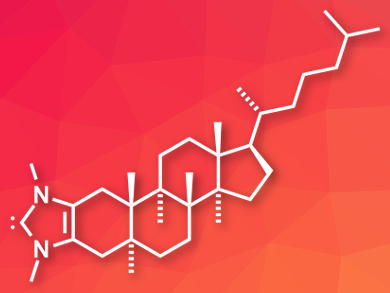N-Heterocyclic carbenes (NHCs) are useful ligands for transition metal catalysis with tunable properties. They can not only be used in transition metal complexes, but also to stabilize metal nanoparticles and modify their catalytic activity.
Bruno Chaudret, Institut des Sciences Appliquées, Toulouse, France, Frank Glorius, University of Münster, Germany, and colleagues have synthesized NHCs based on a cholesterol structure (example pictured) and studied their use as stabilizing ligands for ruthenium nanoparticles (Ru NPs). The team prepared the NHC ligands from the corresponding imidazolium salts using KOtBu as a base. The Ru NPs were then generated by the decomposition of the complex [Ru(COD)(COT)] (COD = cyclooctadiene, COT = cyclooctatriene) under a hydrogen atmosphere in the presence of the NHC ligand.
The team used the NHC-stabilized Ru NPs as catalysts for the hydrogenation of arenes and found that the nanoparticles catalyze the reaction under mild conditions and with high yields. According to the researchers, the rigidity of the cholesterol-based ligands is particularly well suited to give selective and stable catalysts.
- Ruthenium nanoparticles ligated by cholesterol-derived NHCs and their application in the hydrogenation of arenes,
Lena Rakers, Luis Miguel Martínez-Prieto, Angela López-Vinasco, Karine Philippot, Piet W. N. M. van Leeuwen, Bruno Chaudret, Frank Glorius,
Chem. Commun. 2018.
https://doi.org/10.1039/c8cc02833h




